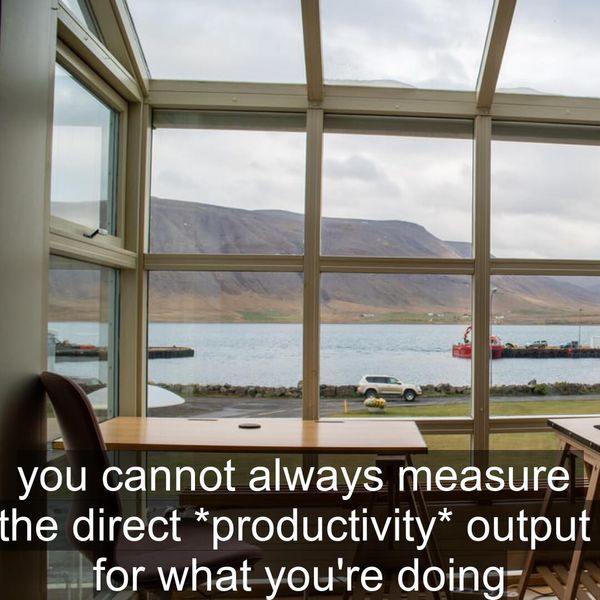We cannot always measure the direct *productivity* output for what we're doing; stop trying.
Last week I spent more time than I'll publicly admit working on a project that has no direct relevance to any other projects in the lab. Don't believe me? See the header image and a short thread below describing a caption-photo generator I built.
Inspired by @yongfook and @bannerbearHQ, I spent the morning playing with programmatic generation of image + text.
— Matthew Hirschey💡 (@matthewhirschey) September 14, 2021
me: "how hard can it be?"
Narrator: It was, in fact, hard
👇 pic.twitter.com/S3t1PvDbo8
In today’s day and age, we are often sucked into a productivity trap. Society expects us to be more productive than yesterday (pandemics be damned). An entire cult industry reveals ways to hack our productivity, self-proclaimed "productivity guys" promise '1 simple trick', the latest tools and apps guarantee more productivity. But there is a fatal flaw with this myopic view.
Productivity is not measured by how busy you are. Productivity is measured by what you get done. Busy is when you have many different things going on; productive is when you are working towards one thing. Busy as being pulled in 1000 directions; productive is 1 direction. Busy is shallow; productive is deep work. Busy is when other people ask for your time; productive is when you have your own time.
But even this view of productivity sacrifices two critical activities
- Learning is not a measure of productivity. You often (ideally) need to learn something to complete the next step. However, learning is inherently difficult to measure and doesn't produce obvious progress.
- Building a system is not a measure of productivity. For example, being able to build 1 widget each day, 365 widgets a year. Or, you can spend one year building a widget maker, which produces 2 widgets a day. Focusing on productivity will not lead to more widgets.
Getting stuck in a productivity trap, where we are busy but not making progress, leads to searching for ways to be more productive. One way we can get out of this trap is by finding balance – a balance between putting your head down and doing the work, and then coming up for air to refresh your perspective, learn something new, only to put your head again down and get work done.
Further, when investing in learning or building a system, it's common to feel unproductive. There will always be a trade-off between doing the thing right in front of us versus investing time in a system or learning to make what we’re doing more efficient. But this might make your next step possible.
So how can you be more productive? Well, buy a book on productivity(TM) – actually read it for bonus points. Or perhaps watch a bunch of YouTube videos on productivity. Or perhaps spend time scrolling to learn what other people are doing to be more productive. Or, just perhaps, find something you like to do, put your head down, and do it. If you're building or learning, realize that being 'unproductive' is required for such an investment.
At the end of the day, people will ask (and you should ask yourself): what did you accomplish? What did you build? Whose lives did you touch? The answers to these questions drive the work, and ultimately, the productivity.
Lastly, many expect productivity to be a linear path upwards. It’s not. It never is. Instead, productivity and progress towards finishing a project comes and fits and spurts. You will find times where nothing is working, nothing is happening, and you’re not making any progress. But then it’s up to you to determine how to move forward. Is it a matter of just doing the work? Or recharging? Perhaps you need a fresh perspective? Or do you need to learn something new to push onward?

I’m not a productivity guy to tell you how to be more productive. But I see many people getting sucked into productivity traps and sacrificing curiosity, learning, and exploration for modern-day output expectations.
So, what am I (a scientist) doing with this unproductive caption-photo generator? Turn it into an app, of course (!?), so others can play, explore, and learn. Creativity, after all, is a combinatorial process. And to be creative means that playing the long game sacrifices short-term productivity in exchange for long-term progress.
Gallery of unproductive images





* why does "never stop learning" show a white guy giving a PowerPoint to a bunch of other white folks in a hotel convention room? Painfully hilarious.
